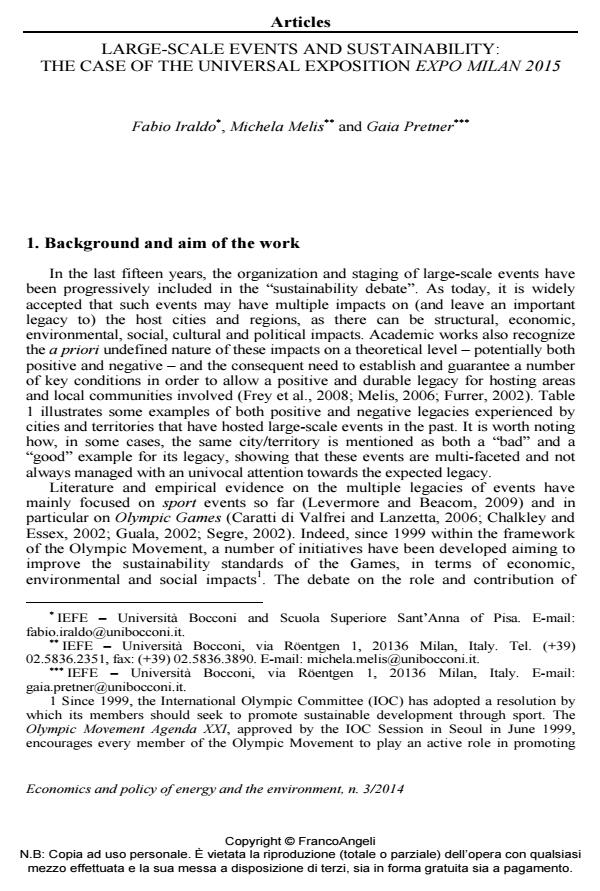Large-scale events and sustainability: the case of the universal exposition Expo Milan 2015
Journal title ECONOMICS AND POLICY OF ENERGY AND THE ENVIRONMENT
Author/s Fabio Iraldo, Michela Melis, Gaia Pretner
Publishing Year 2015 Issue 2014/3
Language English Pages 27 P. 139-165 File size 2337 KB
DOI 10.3280/EFE2014-003008
DOI is like a bar code for intellectual property: to have more infomation
click here
Below, you can see the article first page
If you want to buy this article in PDF format, you can do it, following the instructions to buy download credits

FrancoAngeli is member of Publishers International Linking Association, Inc (PILA), a not-for-profit association which run the CrossRef service enabling links to and from online scholarly content.
In the last fifteen years, the organization and staging of large-scale events have been progressively included in the sustainability debate. As today, it is widely accepted that such events may have multiple impacts on - and leave an important legacy to - the host cities and regions, as there can be structural, economic, environmental, social, cultural and political impacts. Literature and empirical evidence on the multiple legacies of events have mainly focused on large-scale sport events so far. The debate on the role and contribution of Universal Expositions to long term urban and local development strategies is instead relatively young. This article seeks to contribute to the literature that assesses the impacts of large-scale "one-off" events, by taking the forthcoming Universal Exposition of Milan in 2015 as an example to further explore the conditions and requirements that may eventually bring true meaning to the term "sustainable event". The analysis is mainly based on the Expo Milan 2015 experience in sustainability reporting activities, whose goal is to measure, assess and communicate the social and environmental performance of the organising company, the impacts on the territory of the activities that are being carried out, and the level of engagement and dialogue with the stakeholders involved.
Keywords: Sustainability management, wide-scale events, sustainability reporting
Jel codes: Q56, M14, M41
- How do metropolitan cities evolve after the 2008/2012 crisis and the Covid-19 pandemic? An analysis from real estate market values Ezio Micelli, Eleonora Righetto, in Valori e Valutazioni /2023 pp.49
DOI: 10.48264/VVSIEV-20223105 - Proposte di intreccio tra natura e cultura nelle aree protette: il festival Musica in Quota Stefania Benetti, Stefania Cerutti, in Geography Notebooks 4/2024
DOI: 10.7358/gn-2023-002-bece - Managing Minor Events for a Sustainable Tourism Development of an Urban Destination Francesca D'Angella, Ruggero Sainaghi, in International Journal of Business Events and Legacies /2022 pp.49
DOI: 10.63007/FXKF9211 - GHG Accounting for sustainable mega-events: How lessons learnt during the Milan Expo 2015 world fair could lead to less carbon-intensive future mega-events Gallo M, Arcioni L, Leonardi D, Moreschi L, Del Borghi A, in Sustainable Production and Consumption /2020 pp.88
DOI: 10.1016/j.spc.2020.02.007 - Environmental sustainability in the event industry: a systematic review and a research agenda Antonio Cavallin Toscani, Luca Vendraminelli, Andrea Vinelli, in Journal of Sustainable Tourism /2024 pp.2663
DOI: 10.1080/09669582.2024.2309544 - Science of Valuations Ezio Micelli, Eleonora Righetto, pp.133 (ISBN:978-3-031-53708-0)
- Environmental management of sport events: a focus on European professional football Tiberio Daddi, Francesco Rizzi, Gaia Pretner, Niccolò Todaro, Eleonora Annunziata, Marco Frey, Fabio Iraldo, in Sport, Business and Management: An International Journal /2021
DOI: 10.1108/SBM-05-2020-0046
Fabio Iraldo, Michela Melis, Gaia Pretner, Large-scale events and sustainability: the case of the universal exposition Expo Milan 2015 in "ECONOMICS AND POLICY OF ENERGY AND THE ENVIRONMENT" 3/2014, pp 139-165, DOI: 10.3280/EFE2014-003008